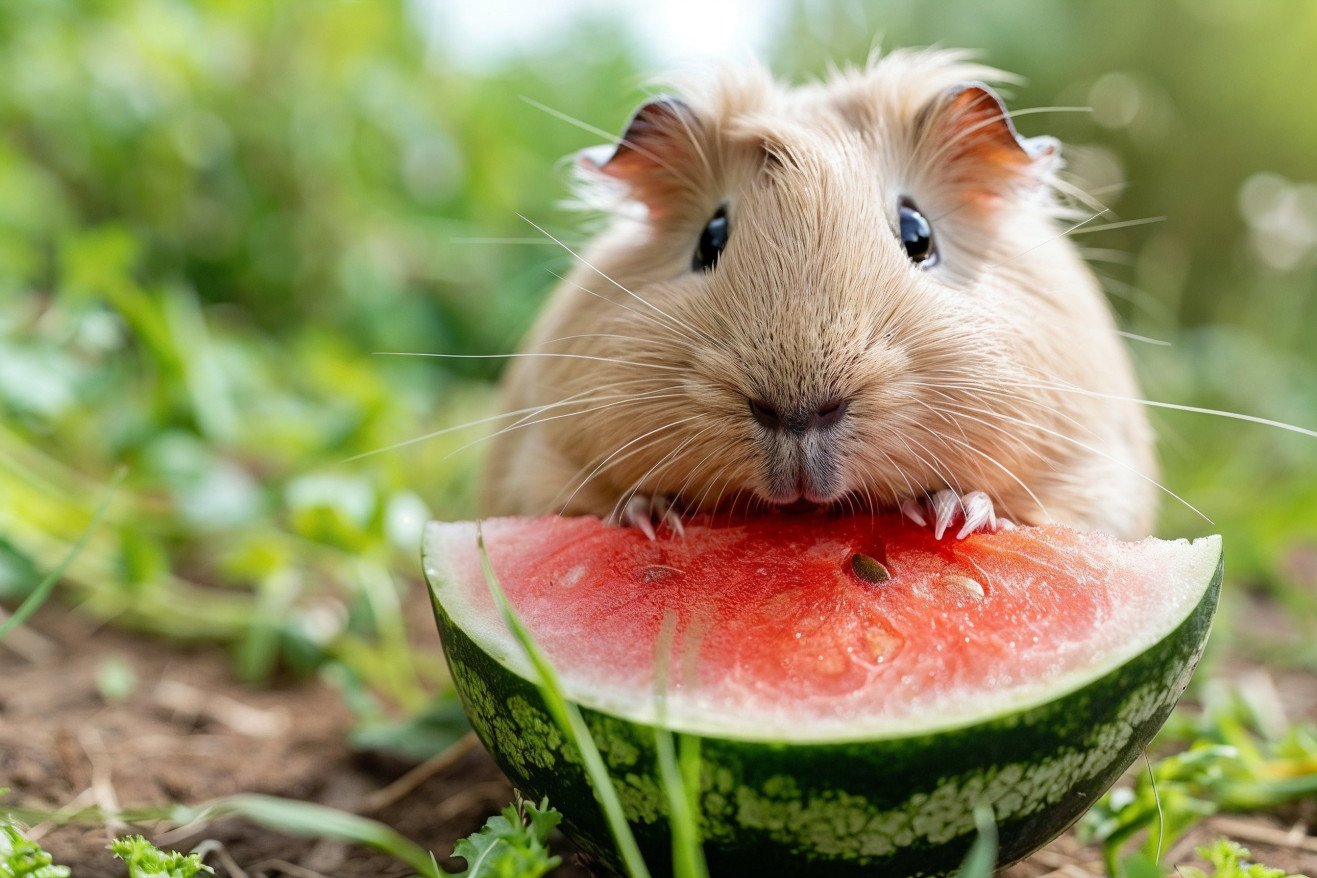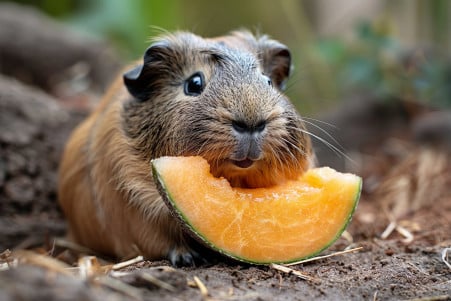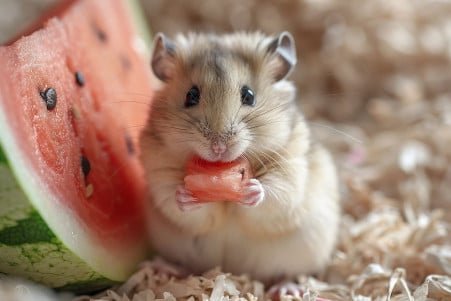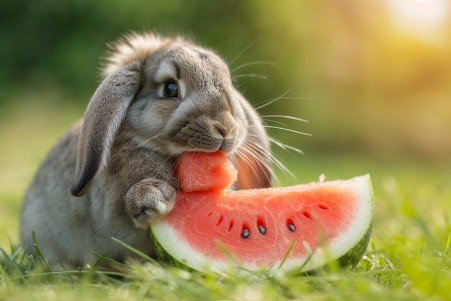Can Guinea Pigs Have Watermelon? Safe Snacking Guidelines
5 March 2024 • Updated 4 March 2024

If you’re a guinea pig parent, you may wonder whether or not you can share the delicious fruit with your pet. The good news is that you can feed your guinea pigs watermelon, but you should do so in moderation and as an occasional treat.
Because of its sugar content, even though it’s high in Vitamin C and water, you should only feed your guinea pig small amounts of the fruit. You should also make sure to remove the seeds and only offer your guinea pig the flesh or rind of the watermelon.
To give you a complete picture, we’ll cover a variety of studies, including those in the veterinary field and nutritional recommendations for small animals. We’ll also discuss the pros and cons of giving guinea pigs watermelon in the context of their specific dietary requirements.
Where fruits like watermelon can be found in a healthy guinea pig diet. Our aim is to give you information from reputable sources so that you can decide what to feed your guinea pig with confidence.
Can guinea pigs have watermelon?
Guinea Pig Diet: Hay, Pellets, Greens, and Treats
Knowing what to feed your guinea pig is important to make sure that they stay healthy and happy. High-fiber hay is the most important part of their diet and should make up about 80% of what they eat each day, according to The Guinea Pig Forum. This not only helps to ensure that their digestive system stays healthy but also mimics their natural eating habits in the wild.
In addition to hay, Burgess Pet Care explains that guinea pigs need vitamin C–fortified pellets and a variety of leafy greens. This is because, unlike many other animals, guinea pigs can’t make their own vitamin C. As a result, they need to get it from their diet to avoid health problems like scurvy.
While fruits like watermelon can help guinea pigs get the vitamin C that they need, it’s important to make sure that they only make up a small part of their diet. According to Small Pet Select, fruits are high in sugar and should be fed to guinea pigs as treats rather than a regular part of their diet. If they eat too much fruit, guinea pigs can become obese and experience other health problems.
The key to a healthy guinea pig diet is balance and variety. Make sure that you feed your guinea pigs a diet that’s high in fiber, low in sugar, and includes enough vitamin C to keep them healthy and avoid diet-related health problems.
Watermelon’s Healthy Impact: A Guinea Pig’s Snack
In addition to being a cool, sweet treat for people to enjoy in the summer, watermelon can also provide some nutritional value for our pets. According to GuineaDad, watermelon is a good source of essential nutrients such as Vitamin C, which is important for preventing scurvy, and potassium, which is important for cell and muscle function in guinea pigs.
It also contains phosphorus, which is important for bone health and tissue repair, and Vitamin A, which is important for healthy vision and skin.
The Guinea Pig Academy notes that the fruit’s high water content can help keep guinea pigs hydrated, especially during the summer months. However, this can also be a downside for the same reason. Because of the fruit’s natural sugars, Kavee warns that while watermelon is safe for guinea pigs to eat in moderation, eating too much can lead to digestive problems and obesity, making portion control especially important.
To help ensure that guinea pigs get the most nutritional value from watermelon while minimizing the impact of its sugar content, many experts suggest feeding guinea pigs the rind instead of the flesh. The rind has less sugar and more fiber, making it a better choice for guinea pigs when it’s fed in moderation.
This is a good way to make sure that guinea pigs can enjoy the taste of watermelon without experiencing the negative effects of too much sugar.
Everything in Moderation: The Dangers of Sugar for Guinea Pigs
Even though a slice of watermelon can be a great way to get your guinea pig to consume more water, it’s important to think about the dangers of sugar for your pet. ScienceDirect explains that sugar can lead to obesity and gastrointestinal issues in rodents. The same source explains that sugar can also impact cognitive and behavioral functions, although this is less consistent across studies.
In terms of guinea pigs, the nutritional content of watermelon, including its natural sugars, can be problematic if it’s consumed in large amounts. As VCA Animal Hospitals explains, fruit should be limited because of its sugar content, which can lead to an imbalance of gut bacteria and diarrhea.
To avoid these issues, it’s important to make sure that you’re feeding your pet watermelon in moderation so that it’s a treat and not a regular part of their diet.
Make sure that you’re introducing water-rich treats like watermelon in moderation. Pay attention to how your pet reacts to new foods and make sure that you’re feeding them the right amount to avoid the dangers of sugar. While it’s important to make sure that your guinea pig is getting enough water, it’s also important to make sure that you’re not giving them too much sugar in the process.
How to Make Sure Your Guinea Pig Stays Hydrated and Healthy
Water is an important part of a guinea pig’s diet, as it helps with temperature regulation, digestion, and other cellular processes. According to Living World Green, water also helps with oxygen and blood circulation to the brain and is important for digestion. Fruits with high water content, like watermelon, can help with hydration, especially in the summer months when the risk of dehydration is higher.
That said, you should be careful about how much watermelon you give your guinea pig, even though it can help with hydration. Oregon State University notes that overhydration can lead to an electrolyte imbalance and even water intoxication in extreme cases. To make sure this doesn’t happen, make sure to give water-rich fruits like watermelon in moderation and always make sure your guinea pig has access to fresh, clean water.
Remember, the key to hydration is balance. Give water-rich fruits as treats and make sure to watch your guinea pig for any changes in behavior or water intake that could indicate a health problem.
By paying close attention to advice from sources like PubMed, which points out that the water needs of small mammals are complex, you can make sure you’re helping your guinea pig stay hydrated through their diet in a safe and effective way. If you do this, you can make sure your guinea pig stays hydrated and healthy.
How to Feed Your Guinea Pig Watermelon
If you decide to feed your guinea pig watermelon, there are some important safe feeding practices to keep in mind. According to PetMD, fruit should comprise less than 5% of your guinea pig’s diet and should be fed infrequently, not daily, due to its high sugar content.
In addition, when it comes to watermelon, you should always remove the seeds to avoid a choking hazard and wash it thoroughly to remove any pesticides and other harmful substances.
More specifically, Small Pet Select recommends feeding your guinea pig small pieces of watermelon no more than once a week as part of the small percentage of fruit in their diet. You should also introduce watermelon to your guinea pig slowly and watch for any changes in their digestion or behavior. Overfeeding watermelon to your guinea pig can lead to obesity and gastrointestinal issues, so it’s important to feed it to them in moderation.
In general, many guinea pig owners feed fruit treats like watermelon to their pets as a special treat or to bond with them, and it’s important to continue to think of them as special treats and not something you feed your guinea pig every day.
As you feed your guinea pig the occasional fruit treat, make sure you continue to prioritize their basic needs, including hay, vitamin C–rich vegetables, and fresh water, to ensure they get the nutrition they need to live a long, healthy life.
Final Thoughts: Watermelon as a Healthy Guinea Pig Snack
To conclude our exploration of whether or not watermelon is a good snack for guinea pigs, we can confidently say that guinea pigs can eat watermelon in moderation. This sweet and juicy fruit can help guinea pigs stay hydrated and meet their vitamin C needs when given in the right way.
However, the high sugar content in watermelon means that it can be dangerous if not given properly. By focusing on portion control, especially when it comes to the rind, and making sure the seeds are removed, you can make sure your guinea pig stays safe and healthy.
On a broader level, the best diet for guinea pigs is a well-rounded one that includes hay, vitamin C–fortified pellets, leafy greens, and the occasional fruit like watermelon. It’s up to pet parents to make sure that the diet they provide is both healthy and safe.
By following the recommendations outlined here, you can make sure that your guinea pig gets the benefits of a diverse diet without the dangers of too much sugar. In the end, it’s up to you to make sure that you’re making choices that will help your guinea pig live a long and healthy life, and that includes making sure that they’re eating a diet that’s healthy and safe.


